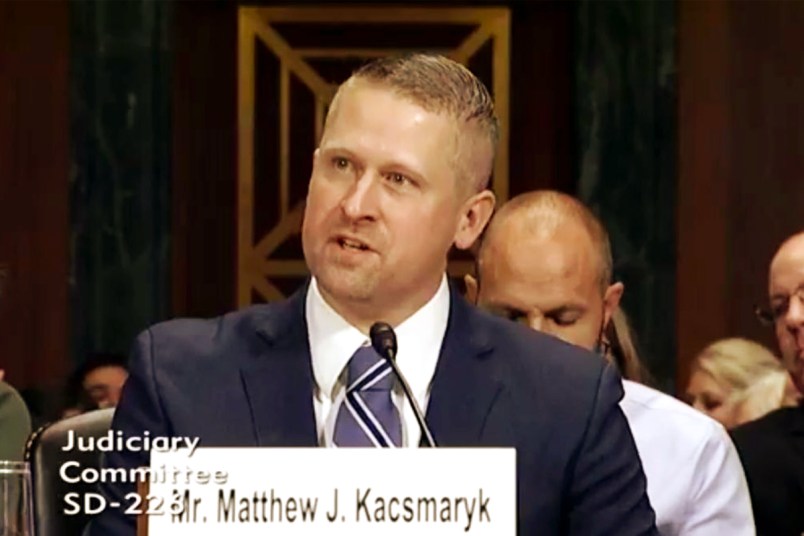This article is part of TPM Cafe, TPM’s home for opinion and news analysis.
Forum shopping: Every lawyer does it. Plaintiffs’ lawyers file cases in the courts where they think they’re most likely to win. Defendants try to get cases moved to more favorable places or dismissed altogether.
But judge shopping? Picking not just a court but the individual judge who hears the case?
Surely litigants aren’t allowed to do that.
Yet judge shopping is the norm in many federal courts throughout the country.
Lately, Republican state attorneys general and conservative activists have been exploiting quirks in rules about how cases are assigned to judges to challenge federal government policies on abortion, immigration, gun control, transgender rights, and more in front of hand-picked, sympathetic, Republican-appointed judges, primarily in Amarillo and Wichita Falls, Texas.
Last month, the Judicial Conference of the United States (a group of judges who oversee the operation of the federal courts), adopted a policy that was widely reported as stopping the ability of plaintiffs to judge shop.
Predictably, the beneficiaries of judge shopping — namely, Republicans — decried the policy as politically motivated and urged district courts to ignore it. Democrats, for their part, demanded that the chief judge of the district encompassing Amarillo and Wichita Falls (the Northern District of Texas) adopt new case assignment rules right away.
But in a letter sent to Senate Democrats last week, the Northern District’s chief judge refused to make any changes, citing a “consensus” among the district’s judges to maintain the status quo. You may not be surprised to learn that Republican presidents appointed ten of those eleven judges.
In short, despite the fanfare surrounding the Judicial Conference’s policy on random case assignment, nothing has changed.
That’s unfortunate. There is no fairness or impartiality among the judges favored by Republicans.

Judge Matthew Kacsmaryk in Amarillo — who, among other extremist rulings, struck down the FDA’s decades-old approval of the abortion drug mifepristone — was an anti-abortion activist before he was appointed by President Trump.
And Judge Reed O’Connor in Wichita Falls struck down the Affordable Care Act in 2018 — six years after the Supreme Court largely upheld that law. (Judge O’Connor’s 2018 ruling was reversed on appeal.)
But high-profile, politically charged cases are not the only cases in which judge shopping wreaks havoc. As we’ve shown in a series of law review articles, judge shopping happens all the time in the obscure but important field of patent law.
In the mid-2010s, for instance, over a thousand patent cases per year — a quarter of all patent cases nationwide — were filed before Judge Rodney Gilstrap in Marshall, Texas (population 23,000). More recently, Waco, Texas, has become the capital of U.S. patent litigation, with Judge Alan Albright receiving nearly one in four patent cases filed nationwide. Though the district encompassing Waco (the Western District of Texas) recently adopted rules that prevent shopping for Judge Albright, early indications are that judge-shopping patentees are heading back to Marshall and to Midland, Texas — both places where it’s possible for a plaintiff to pick their judge.
To bring cases in, the judges like Gilstrap and Albright slant procedures and rulings to blatantly favor patent owners. The patent owners filing cases in Texas are primarily nonpracticing entities (pejoratively, “patent trolls”) — entities that don’t make anything and exist only to assert patents.
And judges have ample incentives to bring patent cases into their courtrooms.
Being known as the judge in a specific area of law brings fame and notoriety. A large patent caseload brings economic benefits to local lawyers, the community, and even the judges themselves. And the “expert” reputation a judge develops can bring lucrative career opportunities when the judge retires from the bench.
The current situation is untenable. No one should be denied access to abortion medication or the opportunity to seek asylum or the entrance to the bathroom of their choice simply because a conservative activist got to pick the judge. Judge shopping in patent cases also harms us all: not only does it corrupt our court system, many patent cases wouldn’t be filed at all if judge shopping weren’t possible. The cost of that needless litigation is baked into everything we buy, from eye medicine to iPhones.
Ideally, the Judicial Conference would do more than adopt a policy suggesting that courts adopt case assignment systems that prevent judge shopping — it would adopt a rule requiring all cases to be randomly assigned among multiple judges.
Though this would be an easy fix, the Judicial Conference seems to doubt whether it can require district courts to do anything to stop judge shopping.
That’s too bad. The federal courts are facing a crisis of legitimacy. Ending judge shopping would restore some semblance of neutrality.







Apologists will tell you our legal system is better than any other. I worked at a farm during my college years so I know all manner of shit. Goose shit is the most onerous. Horse shit is the more benign yet it is still shit.
It’s no surprise these are centered on Texas. Worth remembering that Texas joined the USA and then promptly joined the confederacy.
Two-faced religious chisellers hell bent on power since their founding. Read the history.
The big talking vicious bigot is the Texas watermark.
You don’t have to be old to remember when “activist Judges” were the worst thing in GOP eyes. In fact the gap between that flip flop was just as narrow as between deploring “cancel culture” then going wholesale in effort to cancel Bud Lite.
They stand for nothing.
I beg to differ. They do in fact proudly stand up and support:
(/s)
What is the snark sign for? Seems spot on to me.